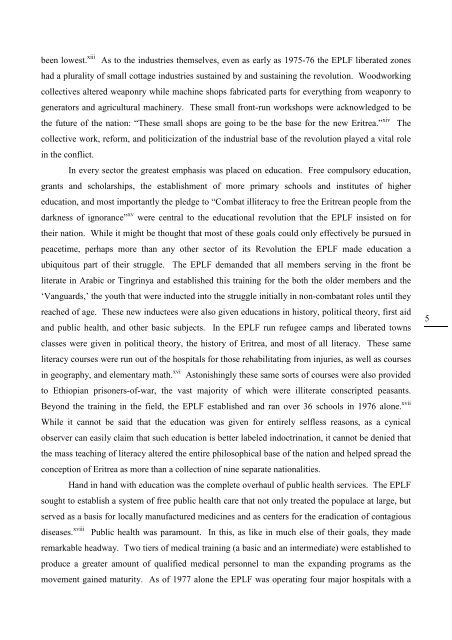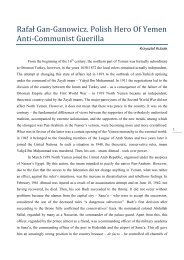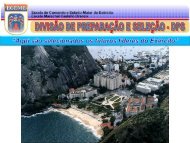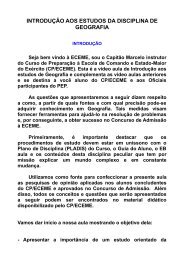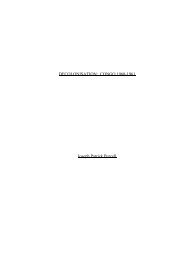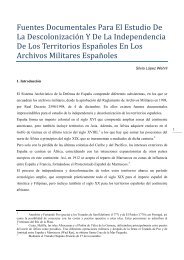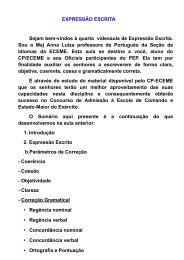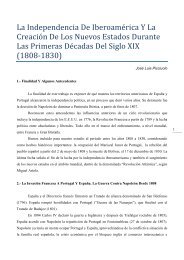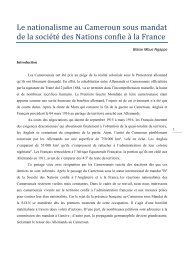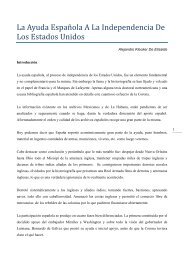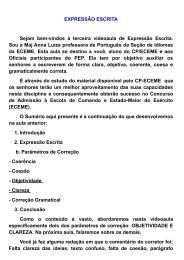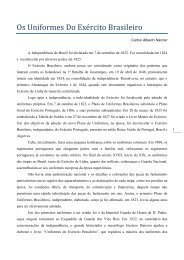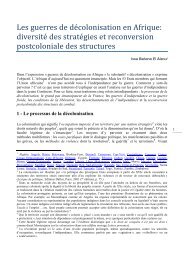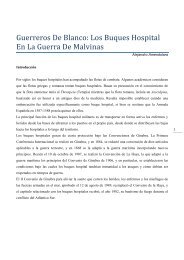34- The Road to Afabet The EPLF, Protracted Warfare, and the ...
34- The Road to Afabet The EPLF, Protracted Warfare, and the ...
34- The Road to Afabet The EPLF, Protracted Warfare, and the ...
You also want an ePaper? Increase the reach of your titles
YUMPU automatically turns print PDFs into web optimized ePapers that Google loves.
een lowest. xiii As <strong>to</strong> <strong>the</strong> industries <strong>the</strong>mselves, even as early as 1975-76 <strong>the</strong> <strong>EPLF</strong> liberated zoneshad a plurality of small cottage industries sustained by <strong>and</strong> sustaining <strong>the</strong> revolution. Woodworkingcollectives altered weaponry while machine shops fabricated parts for everything from weaponry <strong>to</strong>genera<strong>to</strong>rs <strong>and</strong> agricultural machinery. <strong>The</strong>se small front-run workshops were acknowledged <strong>to</strong> be<strong>the</strong> future of <strong>the</strong> nation: “<strong>The</strong>se small shops are going <strong>to</strong> be <strong>the</strong> base for <strong>the</strong> new Eritrea.” xiv <strong>The</strong>collective work, reform, <strong>and</strong> politicization of <strong>the</strong> industrial base of <strong>the</strong> revolution played a vital rolein <strong>the</strong> conflict.In every sec<strong>to</strong>r <strong>the</strong> greatest emphasis was placed on education. Free compulsory education,grants <strong>and</strong> scholarships, <strong>the</strong> establishment of more primary schools <strong>and</strong> institutes of highereducation, <strong>and</strong> most importantly <strong>the</strong> pledge <strong>to</strong> “Combat illiteracy <strong>to</strong> free <strong>the</strong> Eritrean people from <strong>the</strong>darkness of ignorance” xv were central <strong>to</strong> <strong>the</strong> educational revolution that <strong>the</strong> <strong>EPLF</strong> insisted on for<strong>the</strong>ir nation. While it might be thought that most of <strong>the</strong>se goals could only effectively be pursued inpeacetime, perhaps more than any o<strong>the</strong>r sec<strong>to</strong>r of its Revolution <strong>the</strong> <strong>EPLF</strong> made education aubiqui<strong>to</strong>us part of <strong>the</strong>ir struggle. <strong>The</strong> <strong>EPLF</strong> dem<strong>and</strong>ed that all members serving in <strong>the</strong> front beliterate in Arabic or Tingrinya <strong>and</strong> established this training for <strong>the</strong> both <strong>the</strong> older members <strong>and</strong> <strong>the</strong>‘Vanguards,’ <strong>the</strong> youth that were inducted in<strong>to</strong> <strong>the</strong> struggle initially in non-combatant roles until <strong>the</strong>yreached of age. <strong>The</strong>se new inductees were also given educations in his<strong>to</strong>ry, political <strong>the</strong>ory, first aid<strong>and</strong> public health, <strong>and</strong> o<strong>the</strong>r basic subjects. In <strong>the</strong> <strong>EPLF</strong> run refugee camps <strong>and</strong> liberated <strong>to</strong>wnsclasses were given in political <strong>the</strong>ory, <strong>the</strong> his<strong>to</strong>ry of Eritrea, <strong>and</strong> most of all literacy. <strong>The</strong>se sameliteracy courses were run out of <strong>the</strong> hospitals for those rehabilitating from injuries, as well as coursesin geography, <strong>and</strong> elementary math. xvi As<strong>to</strong>nishingly <strong>the</strong>se same sorts of courses were also provided<strong>to</strong> Ethiopian prisoners-of-war, <strong>the</strong> vast majority of which were illiterate conscripted peasants.Beyond <strong>the</strong> training in <strong>the</strong> field, <strong>the</strong> <strong>EPLF</strong> established <strong>and</strong> ran over 36 schools in 1976 alone. xviiWhile it cannot be said that <strong>the</strong> education was given for entirely selfless reasons, as a cynicalobserver can easily claim that such education is better labeled indoctrination, it cannot be denied that<strong>the</strong> mass teaching of literacy altered <strong>the</strong> entire philosophical base of <strong>the</strong> nation <strong>and</strong> helped spread <strong>the</strong>conception of Eritrea as more than a collection of nine separate nationalities.H<strong>and</strong> in h<strong>and</strong> with education was <strong>the</strong> complete overhaul of public health services. <strong>The</strong> <strong>EPLF</strong>sought <strong>to</strong> establish a system of free public health care that not only treated <strong>the</strong> populace at large, butserved as a basis for locally manufactured medicines <strong>and</strong> as centers for <strong>the</strong> eradication of contagiousdiseases. xviii Public health was paramount. In this, as like in much else of <strong>the</strong>ir goals, <strong>the</strong>y maderemarkable headway. Two tiers of medical training (a basic <strong>and</strong> an intermediate) were established <strong>to</strong>produce a greater amount of qualified medical personnel <strong>to</strong> man <strong>the</strong> exp<strong>and</strong>ing programs as <strong>the</strong>movement gained maturity. As of 1977 alone <strong>the</strong> <strong>EPLF</strong> was operating four major hospitals with a5


